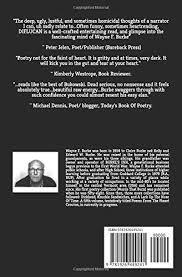This is Wayne F. Burke's sixth full length collection and the fourth published by BareBack Press of Hamilton, Ontario. The writing is characteristically first person, narrative in form and features poems of childhood, teenage, young adult and old man reminiscences.
Asked recently to what extent DIFLUCAN is a "work of fiction" as the disclaimer says at the front of the book, Burke replied machine gun like:
"Not quite sure why the disclaimer (just noticed it), suspect it standard to protect the publisher... A few thoughts: Any poem, being a creative act, is a work of fiction, even though it be, quote, "autobiographical." The Rimbaud quote, pg. 1, is a hint that the "I" used is not necessarily "I" as in "me"--me, myself, and I-- but could just as well be an "other". The "I" of my poem "Max" is a girl (which I ain't). "Max" and a few other poems approach fantasy, but are grounded in reality--in the quotidian--in their particulars, meaning, I think, they COULD have happened. After a reading I did from my book DICKHEAD, a woman asked me "how much of it really happened?" I said, "oh, about 95%." In DIFLUCAN I would say, "oh, about 75%." So, the book is not "fiction,' although contains fantasy (in that I, the writer, is not a vet, or woman, or a murderer (not yet) and yet I, the writer, adopt the guise of those "others." Fantasy would also cover "exaggeration," also called "artistic license." It is an approach to "truth"--my truth--the truth of my experience as I view it--via imagination, which, in literature (think Kafka's METAMORPHOSIS) is often a more powerful expression of reality (whatever is understood by that) than a work of so-called "realism" (Proust--how much of what Proust wrote actually happened, and how much did he make-up? Only Proust knows...). All work of literature a meld of fact and fiction. When an author says this the unvarnished truth, he/she lies, because it, the story, fact or fiction, is the "truth" according to them, to the individual, what they believe the "truth" to be...Hoo boy-- I feel like I am floundering around here in explanation (and before I have had even my first sip of coffee)."
The book consists of forty-four poems which are divided into seven loosely thematic sections. The title poem for Part 1, for example, as mentioned above reads: "I is another" Rimbaud. This part consists of three poems- "Happy Birthday "from the point of view of a Vietnam vet, "Rusty" from a cranky psychopath, and perhaps the strangest poem in the collection, "Max" from the perspective of a deranged homeless woman- who Kafkaesquely gives birth to an alien:
Max
I got a room in the YMCA
which was immeasurably better than
sleeping outside
on a bench in the park though
the Y was not without problems,
like the roaches who
came out at night
and ran across my face
I tried to sleep with my mouth closed
but woke one night
after a tickling in my throat
and swallowed a roach
who started to walk around
inside of me
I could feel it
and would punch myself in the belly
and people probably thought I was funny
but I never could kill it and
finally
I went to see a doctor
and was given some pills
I took
but stopped after
over-hearing some trees talking
about me
I drank some Clorox
to kill the roach
but only made myself ill
and I went to the hospital
and had my stomach pumped
(I hate that)
and still the roach
I could feel kicking
and getting bigger
and I decided to cut it out,
and bought a knife
for twenty dollars
but
before I cut
the thing came out
suddenly,
a healthy seven-pound boy
with a little roach-face
and two adorably cute antennae.
Part 3 consists of six poems with an intro, simple enough:
bent farmer-girl
plants thoughts
inside my head
This section deals with the speaker's early encounters with his sexuality. These poems are wry narratives about a simple misunderstanding ("Bathroom"), betrayal ("Debbie"), spitting the goolie ("Flute-o-phone") and a Bukowski like fantasy of a school boy being seduced by a friend's mother ("Eclipse").
Here's another poem from the section which expresses a restrained, but satiric sexual tension:
#2 Pencil
I told the woman at the
art store
that I wanted the same brand of pencil
and paper that
Andrew Wyeth used
and she said, "Andy used a #2 pencil" and
as she moved around me
to the pencil case
her rear end brushed against me
and the tip of my dick
and as she told me about the pencil
she looked at my cock and
I looked at her tits
and when she leaned to finger
some pads
my dick was plastered against her face.
"This is what Andy used," she said and
handed me a pad.
"What would Andy do in my situation?" I asked
myself.
"I will take it," I said,
and she stood, went
behind the counter,
and rang up the sale.
I put the #2 pencil in my pocket
and left.
(all poems posted with the permission of the poet)
The title DIFLUCAN miffed me so I put the question to Burke. He replied, "The thought was that Diflucan, as a drug to treat yeast infections--a healing drug--could, in a poetic sense, treat neurosis or "whatever ails you", --a balm of some type (as poetry--writing it and reading it) has been for me (hence, by the way, the medically-themed cover).
DIFLUCAN is easy to read, entertaining and characteristically driven by Wayne F. Burke's quirky humour.
Buy the book here: https://www.amazon.com/Diflucan-Wayne-F-Burke/dp/192644924X


No comments:
Post a Comment